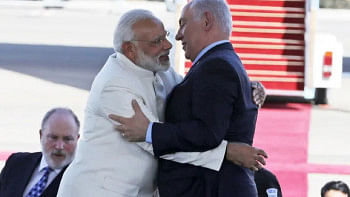Govt seeks long-term LNG contracts with Qatar

The government is negotiating with Qatar seeking long-term contracts for the import of liquefied natural gas (LNG) as prices have abnormally climbed in international spot markets, said Salman F Rahman, the prime minister's private industry and investment adviser, yesterday.
As an alternative source, the government is trying to import fuel from India, he said.
India has started buying oil from Russia despite criticisms from the US that it would help fuel the Ukraine invasion. Last Thursday the cabinet said Bangladesh can not import oil from Russia.
Even if crude oil is imported from Russia, Bangladesh's lone oil refinery, Eastern Refinery, does not have the capacity to avail all the hydrocarbon products through fractional distillation, Rahman said.
The government currently imports crude oil fractions such as diesel and heavy fuel oil from 14 different sources to meet domestic demand at this time of the energy crisis, said Rahman said.
The government is mainly looking for alternatives to local gas as more than 70 per cent electricity is produced from gas-fired power plants, he said.
The energy crisis is the biggest challenge for the economy in the next six months, he said.
Recently, the LNG prices in the spot markets have gone up so high that the government finds it too much of an expense to accommodate, for which it was seeking long-term contracts, he said.
However, Rahman did not provide the difference between spot market and long-term contract prices.
The adviser also said since there was no controversy over availing Russian grains like wheat alongside fertilisers, the government was trying to import those to meet local demand.
Rahman was speaking at a "Meet the Overseas Correspondents Association of Bangladesh (OCAB)" at the office of Bangladesh Investment Development Authority (BIDA) in Dhaka.
Journalists from different international and local media outlets participated in the discussion.
Regarding banking issues, the adviser said the government has no plan at the moment to withdraw the interest rate cap, mainly to favour industries, in spite of being recommended by different economists.
However, a decline in imports from $9 billion in January to more than $5 billion in August helped curtail both inflation and a rise in the exchange rate of the US dollar with the local taka.
The adviser was hopeful that the exchange rate would soon come down to Tk 100 or below per US dollar as the forex market was returning to normalcy for the government measures.
Many local traders have been hiking prices of consumer goods with the excuse of it being a ripple effect from international markets, he said.
For instance, the price of eggs, a widely consumed item, went beyond the purchasing capacity of many consumers two weeks ago. Though it has come down to some extent, it is still high, the adviser said.
Bangladesh, India and Nepal are jointly working to develop a hydroelectricity project to meet growing demand for power, he said, adding that the government was also working to fix transit roads and waterways with India.
The adviser said Bangladesh has sought Chinese investment in the manufacturing sector as most of the existing Chinse investments are concentrated on public projects.
Moreover, China has allowed duty free access to 98 per cent of Bangladeshi products entering the market.
An active pharmaceuticals ingredient (API) park has already been developed and it will go into operation soon with gas connections provided under a special arrangement from the energy ministry, said the adviser.

 For all latest news, follow The Daily Star's Google News channel.
For all latest news, follow The Daily Star's Google News channel. 








Comments